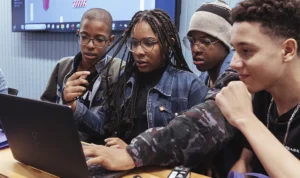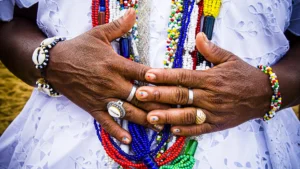Until he was 39 years old, Mario Gomes did not recognize himself as a black person. “My flag was always black, but in my head I wasn’t a black man”, he says. “My pain was because I had no idea about miscegenation and colorism. When you are unaware, anything they say, you believe.”
Only after being hired as a Customer Experience manager (Customer Experience or CX) by iFood, almost 4 years ago, is when he assumed this identity. And he went further: today he is the leader of iFood's Black Pride, one of the five committees of Pólen, a group of company employees that debates topics also related to women, disabled people It is LGBTQIAP+ and free body movement.
“For those who didn’t see themselves as black men, representing this group on iFood is a life transformation,” says Mario. This change began when iFood invited the CX manager to an institutional campaign about diversity. He refused because he did not consider himself a black man.
But, after a lot of conversation, study and research with family members, he said “yes”. “I did my family tree to find out my ancestry and went to visit where my mother was born and raised, close to where the region of quilombo dos Palmares. Relatives told me where my family was from and that my grandfather, a black man, came from there”, he says.
With the campaign on social media, Mario recognized himself, for the first time, as a black person. “I asked myself, ‘where was this black man that I couldn’t see?’.” Debating issues such as racial self-awareness is one of Black Pride's missions. “One of the” because the group, currently made up of more than 500 people, addresses topics such as empowerment, personal development, acceptance and racial literacy, in addition to closely monitoring the evolution of the company's diversity goals.
“iFood made several hirings of wonderful black people in recent months. Our idea is to give a voice and provide a place for these professionals, within this feeling of belonging, to also be able to express themselves, bring knowledge and show stories that enrich, inspire and strengthen the black community”, says Mario.
In an interview with iFood News, he explains what Black Pride does and what are the ways to empower black people in the company and nurture an anti-racist corporate culture.
IFN – Black Pride is one of the Pollen committees, right?
Mario – Yes. Pólen is a safe environment for people from the same group of underrepresented groups to discuss topics that are generally taboo or cause some discomfort.
The strength of Pólen comes from the autonomy we have at iFood and from being a safe environment to be who we really are. We don’t need to create a character, and this means that we also take up this space to say: “okay, I’m not the only black gay person here. Who else? Where are the other people? Where are the black women who work here?”
IFN – And how does Black Pride work?
Mario – We have a channel on Slack [messaging application] with more than 500 black people where we exchange and share knowledge, including those produced by many FoodLovers [iFood collaborators] who defend their master's theses and then share them with the committee. The channel keeps everyone super updated.
Furthermore, we have an annual plan with themes to be addressed every month to care for and feed four pillars of our black community at iFood.
IFN – What are these pillars?
Mario – The first is community empowerment, the issue of belonging. This way we show that, even if you are the only black person in your area, you know that on iFood there are many other people with stories and struggles very similar to yours.
The second brings up the issue of personal development, knowledge and prosperity of the black community. This pillar has an important message of seeking lifelong learning [continuing education].
The third pillar seeks to build a welcoming and safe environment. We care that all people experience racial literacy. We don't want the agenda of a meeting to be hair black power someone. We have a robust course on anti-racist culture for leadership and all FoodLovers. The idea is to foster a space where people have racial awareness to encourage anti-racist attitudes.
The fourth pillar are actions to monitor the evolution of affirmative action here inside. We are proud that iFood has publicly committed to working towards historical reparation and hiring black people at all levels, including senior leadership.
IFN – How safe and prepared is iFood to welcome black workers?
Mario – I've been here for almost four years and, when I joined, there were only white people. I consider it an achievement to see that the goals are working [iFood hired 750 black people between November 2021 and March 2022]. You still need to have a upgrade, as in senior leadership positions, but there are actions for this, such as the acceleration program for black people, of which I am part.
Every week I talk to three black people here at iFood to talk about their life stories and get a “thermometer” of how things are going. We are still far from ideal, as I said, but what I can say is that this feedback It always brings the same message: for the first time they feel included and that affirmative action is a fact. This NPS [metric used in CX to indicate customer satisfaction] that I create brings a lot of happiness and satisfaction. So, it is possible to say that this is our place.
IFN – How do you bring non-black people into this discussion?
Mario – Our monthly meetings are still held by and for black people. But I intend to take the possibility of opening it up to the committee so that everyone can participate. This does not mean that we do not have anything structured for this exchange. We have diversity and inclusion ambassadors in the most different areas of iFood, we carry out lives addressing black protagonism and iFood itself addresses the issue in quarterly meetings where the entire company meets.
IFN – How can white people be allies?
Mario – It's a combination of broadening your perspective to understand the biases of this historical construction that needs to be broken and exercising empathy: really putting yourself in people's shoes, being open to listening and practicing behavioral changes. All this based on the respect.


